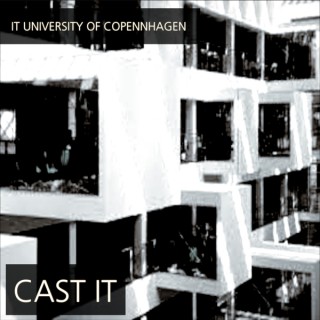Podcasts about bubble studies
- 7PODCASTS
- 7EPISODES
- 38mAVG DURATION
- ?INFREQUENT EPISODES
- Jan 25, 2021LATEST
POPULARITY
Latest podcast episodes about bubble studies
Vincent Hendricks - Professor of Philosophy & Director: Center for Information & Bubble Studies
A brief summary of this episode
An Interview with Lucas Cone and Joachim Wiewiura on If Schools Didn't Exist
Lucas Cone is a PhD student at the Danish School of Education, Aarhus University. He earned his MA in Education at the Graduate School of Education and Information Studies, University of California, Los Angeles (UCLA). His doctoral research examines the use of commercial services in public schools, focusing on how they impact teacher, student, and community relations in school. Joachim Wiewiura is PhD Fellow at the Center for Information and Bubble Studies, University of Copenhagen. He specializes in political philosophy and writes a thesis on the concept of the public sphere. Besides political philosophy, he is interested in architecture and urban sociology. If Schools Didn't Exist - https://mitpress.mit.edu/books/if-schools-didnt-exist
On Episode 49, Nick chats with Vincent Hendricks, Professor of Formal Philosophy and Director of the Center for Information and Bubble Studies at the University of Copenhagen, about the importance of reasoning through illustrations, applying ideas from finance and economics to questions in philosophy of science, the ways in which our children influence our philosophical thinking, and his latest book, Reality Lost: Markets of Attention, Misinformation and Manipulation.FULL EPISODE TRANSCRIPT
Rosenkjær-eksperimenterne på P1 - med Vincent F Hendricks: 1:6 Er du klogere end de andre?
Årets P1 Rosenkjær-prismodtager Vincent Hendricks tester i en række eksperimenter, i hvor høj grad vi er underlagt social påvirkning. I dagens udsendelse bliver en gymnasieklasse forsøgskaniner. Gennem en række digitale spil bliver eleverne testet for, hvor meget de stoler på deres egen dømmekraft. Hvad vejer tyren på billedet? Hvad tror du, og hvad tror de andre i klassen? Lader vi os påvirke af, hvad andres synes? Er 'flokken' klogere end individet? I studiet fortæller Vincent Hendricks om baggrunden for testen og tegner de dybere perspektiver ud fra testens resultater. Dagens gæst er Robin Engelhardt, postdoc ved Center for Information and Bubble Studies. Vært: Vincent Hendricks. Tilrettelæggelse: Kåre V. Poulsen og Mikkel Andersson.
We ask Vincent F. Hendricks, professor of formal philosophy at Copenhagen University and the director of the Center for Information and Bubble Studies how to think about information, knowledge, and truth, in the internet age, where information is quickly shared or algorithmically curated, and where the model of liberal democracy, such as the public sphere, are undergoing rapid change. We talk about fake news, Trump, radical scepticism, social psychology, filter bubbles, power laws of attention economics, and pluralistic ignorance.Vincent’s web page is at http://vince-inc.com/vincent/ and his 2016 book on explaining individual behaviour on the social net is Hendricks and Hansen, “Infostorms,” Springer 2016.
We ask Vincent F. Hendricks, professor of formal philosophy at Copenhagen University and the director of the Center for Information and Bubble Studies how to think about information, knowledge, and truth, in the internet age, where information is quickly shared or algorithmically curated, and where the model of liberal democracy, such as the public sphere, are undergoing rapid change. We talk about fake news, Trump, radical scepticism, social psychology, filter bubbles, power laws of attention economics, and pluralistic ignorance.Vincent’s web page is at http://vince-inc.com/vincent/ and his 2016 book on explaining individual behaviour on the social net is Hendricks and Hansen, “Infostorms,” Springer 2016.
Why Facts Don't Matter in the 2016 Presidential Election
Between the hours of 3 AM and 5 AM Friday morning, Republican presidential nominee Donald Trump went on a tweetstorm in which he was, you know, just saying that Hillary Clinton helped former Miss Universe (and a target of Trump’s misogyny) Alicia Machado become a US citizen “so she could use her in the debate.” Is that true? Like, almost certainly not—but in this election season, truth and facts hardly seem to matter. Trump's attacks on Machado are just the latest data point in an election cycle that has seen wild speculation, rampant exaggeration, and outright lies become accepted as fact by huge swaths of the electorate on both sides of the aisle. If we’re living in a post-factual era, how did we get here? Vincent F. Hendricks set up the Center for Information and Bubble Studies at the University of Copenhagen to study how individual and media behavior online has created a reality where virality, social spread, and repetition is all that’s required for people to believe something is true. While “facts” haven’t gone totally by the wayside, the way we cherry pick facts to make alternate realities has created a political system (and a culture) where we can’t have rational arguments because we can’t even agree on a baseline of truth. Radio Motherboard spoke to Hendricks about this week’s debate and about his new book, Infostorms, which explores how our likes, upvotes, retweets, coupled with social media algorithms and brash politicians with a disregard for the truth are redefining rational society. See acast.com/privacy for privacy and opt-out information.










